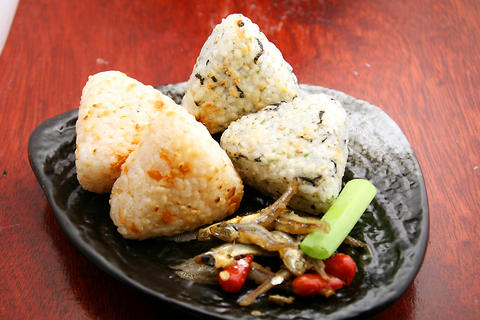What happens when three 20-something female fitness instructors decide to shift careers and enter the culinary business? The answer is a homelike barbecue restaurant that offers a wide variety of grilled delicacies spiced up with healthy sauces prescribed by practitioners of Chinese medicine.
Rarely adopted in other barbecue joints, Chinese herbs are key ingredients in the eatery's savory sauces, dressings and beverages. The signature teriyaki marinade, for example, is made with various medicinal herbs that are added to the broth.
For those who like their food simple and palatable, the de-shelled shrimp plate (NT$90) comes highly recommended, not just for the competitive price, but also for the simple salt and pepper seasoning that brings out the freshness of the food. The juicy boneless beef sparerib (NT$150) is another favorite that is flavored with sesame oil and the specially concocted blend of Chinese herbs.

PHOTO: COURTESY OF DA YA CHI
Also not to be missed are the creamy mushrooms (NT$90), de-boned chicken leg (NT$40) and scallops (NT$80). The barbecue plate (NT$380) is the restaurant's most popular grilled dish.
Creativity is highly esteemed at Da Ya Chi. The three proprietors like to try out new ideas for their specials. One such item is the grilled glutinous rice cake with sausages - an appetizing mix of sweet and savory flavors with a slightly charred tang. The handmade ramen noodles with pork (NT$60) is another must-try special that teases the taste buds with the slightly spicy secret sauce made from eight seasonings.
To keep the place fresh and fun, new additions are added to the menu every one to two weeks and promotional events, ranging from happy hours to lucky draws, are held every two months.
Besides a decent selection of beer, the staple drink in the barbecue world, plum juice and honey chrysanthemum tea are also available. These non-alcoholic alternatives are recommended by Chinese doctors to keep hydrated in the intense summer heat.
Service here is friendly. Beyond that, the sociable owners employ their experience at Alexander Health Clubs by counseling members on diet and exercise.
For after-dinner entertainment, diners can even make use of the dart board in the back of the restaurant.

In the March 9 edition of the Taipei Times a piece by Ninon Godefroy ran with the headine “The quiet, gentle rhythm of Taiwan.” It started with the line “Taiwan is a small, humble place. There is no Eiffel Tower, no pyramids — no singular attraction that draws the world’s attention.” I laughed out loud at that. This was out of no disrespect for the author or the piece, which made some interesting analogies and good points about how both Din Tai Fung’s and Taiwan Semiconductor Manufacturing Co’s (TSMC, 台積電) meticulous attention to detail and quality are not quite up to

April 21 to April 27 Hsieh Er’s (謝娥) political fortunes were rising fast after she got out of jail and joined the Chinese Nationalist Party (KMT) in December 1945. Not only did she hold key positions in various committees, she was elected the only woman on the Taipei City Council and headed to Nanjing in 1946 as the sole Taiwanese female representative to the National Constituent Assembly. With the support of first lady Soong May-ling (宋美齡), she started the Taipei Women’s Association and Taiwan Provincial Women’s Association, where she

Chinese Nationalist Party (KMT) Chairman Eric Chu (朱立倫) hatched a bold plan to charge forward and seize the initiative when he held a protest in front of the Taipei City Prosecutors’ Office. Though risky, because illegal, its success would help tackle at least six problems facing both himself and the KMT. What he did not see coming was Taipei Mayor Chiang Wan-an (將萬安) tripping him up out of the gate. In spite of Chu being the most consequential and successful KMT chairman since the early 2010s — arguably saving the party from financial ruin and restoring its electoral viability —

It is one of the more remarkable facts of Taiwan history that it was never occupied or claimed by any of the numerous kingdoms of southern China — Han or otherwise — that lay just across the water from it. None of their brilliant ministers ever discovered that Taiwan was a “core interest” of the state whose annexation was “inevitable.” As Paul Kua notes in an excellent monograph laying out how the Portuguese gave Taiwan the name “Formosa,” the first Europeans to express an interest in occupying Taiwan were the Spanish. Tonio Andrade in his seminal work, How Taiwan Became Chinese,